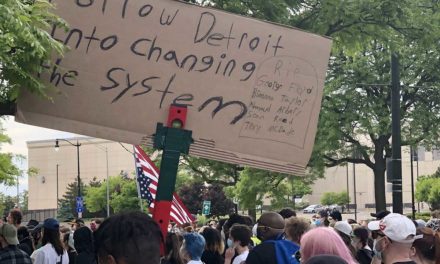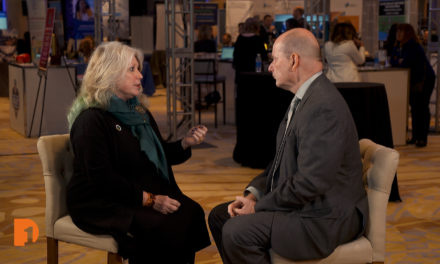The systemic injustices of mass incarceration and the prison industrial complex have been put on display through a powerful one-woman play, “The Peculiar Patriot,” now playing at the Detroit Public Theatre through March 5. The show follows ‘Betsy’ LaQuanda Ross played by playwright and performer Liza Jessie Peterson, whose character is no stranger to the New York State Penitentiary system.
“Her regular visits to loved ones in various upstate institutions have made her quite the expert and a self-proclaimed “Peculiar Patriot.” In-between neighborhood updates and gossip, Betsy educates herself and the audience on the systemic inequity within America’s prison complex system and its effect on those behind bars, as well as their family and friends,” the play’s description says.
In her personal and professional life, Peterson has also become closely familiar with America’s prison system. The play was inspired by Peterson’s years of research and personal experiences, teaching and working with incarcerated people, and seeing the effects of the prison system on loved ones.
RELATED:
- Returning citizens disproportionately locked out of Michigan’s workforce
- Ray Gray, one of Michigan’s longest-serving inmates, is free
- Detroit Public Theatre presents Heather Raffo’s ‘Noura,’ an Iraqi American story of belonging
- Detroit Public Theatre performs ‘Detroit ’67’ production based on Detroit 1967 riots
One Detroit’s Chris Jordan sat down with Peterson at the Detroit Public Theatre’s new theater to learn more about the inspiration behind the play and the impact it had on incarcerated people who’ve seen it performed. Plus, he talks with Detroit Public Theater Co-Founder and Producing Artistic Director Sarah Clare Corporandy about the theater’s Shakespeare in Prison program and how “The Peculiar Patriot” aligns with the program’s mission.
The show is offering a limited number of free and discounted tickets to all performances to those who’ve been impacted by the justice system. Find more information about tickets and discount codes here.
Full Transcript:
Liza Jessie Peterson, Playwright & Acrtress, The Peculiar Patriot: ‘The Peculiar Patriot’ is a love story. And it takes place on the visiting one floor of a women’s correctional facility. So, it’s about the protagonist, Betsy LaQuanda Ross, who I play. And she’s visiting her best friend who’s incarcerated. And the audience is eavesdropping in on a conversation.
It came about through my work with incarcerated adolescents at Rikers Island. I was a teaching artist there for many years, and I also had a boyfriend at the time who was incarcerated. My whole life, my professional life, and my personal life was immersed in carceral systems. So the play came from those experiences.
Sarah Clare Corporandy, Co-Founder/Producing Artistic Director, Detroit Public Theater: It’s just a really amazing and important piece that we’re really proud to bring here. Frannie Shepherd-Bates, who runs our Shakespeare in Prison program, saw the piece out in San Diego and came back and just said, “I think this is a wonderful piece. I think this is a really important piece, and I think it connects strongly with our Shakespeare in Prison program.” Shakespeare in Prison goes into– it was started at the Women’s Huron Valley Correctional Facility, and it’s the only women’s prison in Michigan.
And we go in there and work with the incarcerated people there to put on a Shakespeare play. It is a very collaborative experience. There’s not a hierarchy in that room. We work for nine months with that team to produce the play, to analyze the text, to direct it. Everyone has a life-changing experience. It’s important for us that our work connects with the community. And so, to highlight our Shakespeare in Prison program, that is like our core community program here, with this piece and to bring our audience closer to the work that, that program is doing is a real joy.
Liza Jessie Peterson: The power of art is that people are able to connect to the humanity of the human being as opposed to a talking head just spouting statistics. I have to credit my director, Talvin Wilks, in the early stages of the development of the play, I did have a lot of statistics and he said, “This is not a lecture.” He said, “The play cannot become didactic. You have to lift it into story. You have to lift it into character.”
When I was a teaching artist at Rikers Island back in 1998, that was my first introduction to the prison industrial complex as we know it today, mass incarceration. And I was there to teach poetry to adolescent boys, 16, 17, 18 years old, who were attending high school at Rikers Island.
Yes, there were and still are adolescents at Rikers Island. And it was a correctional officer, my first week there who said he asked me, he said, “You don’t know where you are, do you?” And I said, “Yes, I’m at Rikers Island.” He said, “No.” He said, “You’re on a modern-day plantation.” And he pointed to the boys who, again, like I said, were 16, 17, 18 years old. And he pointed to them and he said, “They’re the new crops. That’s the new cotton.” In the antebellum South, slavery was too dirty of a word in polite circles, so they referred to it as the peculiar institution, as a way to, I guess, sanitize it.
And so, I took the term peculiar and I said, Wow. Slavery has morphed into what we now know as mass incarceration. So, we’re still dealing with this peculiar institution. And I’m a poet and a writer, so we’re always looking at language. And what is a patriot? A patriot or someone who supports their nation, their country. And so, if there’s a nation and a country of citizens who are behind barbed wire, who are the people that support them, aren’t they patriots?
Sarah Clare Corporandy: People are walking out blown away, speechless, motivated, moved. When you sit in the space and hear the reactions of the audience, the camaraderie as Liza’s character comes out and reveals herself, it’s therapeutic to be reminded that even a story that maybe to some of us feels far away, is actually not that far away from all of us.
Liza Jessie Peterson: I performed this play at Angola Penitentiary in Louisiana back in 2020, right before the pandemic hit. And there’s actually a documentary that was just shortlisted for an Academy Award called “Angola Do You Hear Us?” We found out afterwards, two years later that the play actually activated the men and since that performance, the men who were politically activated, they got on the phones, they called their family members and they activated their family members to vote for specific candidates.
So, two black female judges were elected in that parish, a progressive D.A., and a black sheriff. And as a result of the performance which activated the men, approximately 300 men have been released from Angola Penitentiary. You know, as an artist, we want to impact audiences. We want our art to do something, to change, to heal, to uplift, to enlighten, to entertain.
You know, every artist has their own idea and intention. And I knew that I wanted my play to activate, but I had no idea what the activation was going to look like because you never know. But I had the blessing of finding out the power of art and activism, the intersection had a direct impact on hundreds of men coming home.
Stay Connected:
Subscribe to One Detroit’s YouTube Channel & Don’t miss One Detroit Mondays and Thursdays at 7:30 p.m. on Detroit Public TV, WTVS-Channel 56.
Catch the daily conversations on our website, Facebook, Twitter @DPTVOneDetroit, and Instagram @One.Detroit
View Past Episodes >
Watch One Detroit every Monday and Thursday at 7:30 p.m. ET on Detroit Public TV on Detroit Public TV, WTVS-Channel 56.




